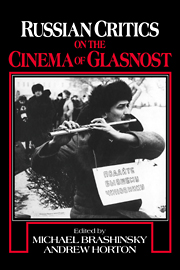Book contents
- Frontmatter
- Contents
- Acknowledgments
- Introduction
- Part One Films in a shifting landscape
- Part Two Glasnost's top ten
- I Repentance
- II Is It Easy To Be Young?
- II A Forgotten Tune for the Flute
- IV The Cold Summer of '53
- V Assa
- VI Commissar
- VII Little Vera
- VIII The Days of Eclipse
- IX The Needle
- X Taxi Blues
- Conclusion
- Directors' biofilmography
- Filmography
- About the contributors
- About the editors
- Index
VI - Commissar
Published online by Cambridge University Press: 04 August 2010
- Frontmatter
- Contents
- Acknowledgments
- Introduction
- Part One Films in a shifting landscape
- Part Two Glasnost's top ten
- I Repentance
- II Is It Easy To Be Young?
- II A Forgotten Tune for the Flute
- IV The Cold Summer of '53
- V Assa
- VI Commissar
- VII Little Vera
- VIII The Days of Eclipse
- IX The Needle
- X Taxi Blues
- Conclusion
- Directors' biofilmography
- Filmography
- About the contributors
- About the editors
- Index
Summary
During the Civil War in the 1920s, Red Army troops enter a small Southern town that they have just retaken from the Tsarist White Guard. Unexpectedly, it turns out that the squad commissar, Klavdia Vavilova, is pregnant. The commander decides to put her up in a slum hovel belonging to a tinker, Yeflm Magazanik. It is rather hard for the commissar to get on in the strange milieu of a large Jewish family. Besides, her upcoming motherhood appears to her as an unfortunate encumbrance to military service. But time passes, the commissar becomes a mother, and this unsmiling, stern warrior grows soft and womanly. But soon the White Guard has taken the offensive and the Reds have to leave town. Vavilova faces a dilemma: stay and wait for better times, or leave the child with the family who sheltered her and return to the ranks. She chooses the latter.
Commissar [Komissar). Directed by Alexander Askoldov; screenplay by Askoldov (based on the short story “In the Town of Berdichev” by Vasily Grossman); cinematography by Valery Ginzburg; production design by Sergei Serebrennikov; music by Alfred Schnittke. Cast: Nonna Mordyukova, Rolan Bykov, Vasily Shukshin, and Raisa Nedashkovskaya. Black and white, 109 min. Gorky Studios (1967)/ Mosfilm Studios (1987) production.
6. In Jewish tinker Yefim Magazanik's (Rolan Bykov, center) nightmarish flashforward, the Jews of the early 1920s are led to the gas chambers of the 1940s in Commissar (made in 1967, released in 1987), Alexander Askoldov's visionary tale of love, war, maternity, and betrayal. (Photo: Kinocenter and Sovexportfilm.)
The credits are studded with stars and celebrities; the cast includes such famous actors as Nonna Mordyukova, Rolan Bykov, and Vasily Shukshin.
- Type
- Chapter
- Information
- Russian Critics on the Cinema of Glasnost , pp. 97 - 102Publisher: Cambridge University PressPrint publication year: 1994

